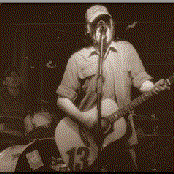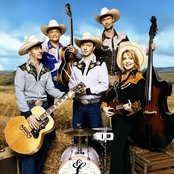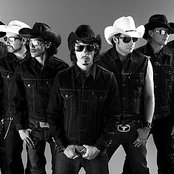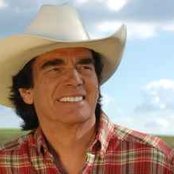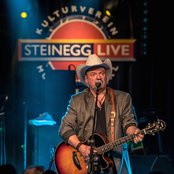by Jessica Gentile
Given country music's deep-seated roots in the American South, you'd probably expect the listening capital of the genre to be in Texas or Tennessee. But when we analyzed the data behind Last.fm user's listening habits we were surprised to learn that Hamburg, Germany contains the highest percentage of country music listeners. This less-than-intuitive finding led us to research an unlikely phenomenon. What we found is a vibrant musical scene filled with Wild West obsessives and wannabe cowboys. This colorful fetishization of the American frontier has inspired a rabid, cult-like following that's persisted for generations.
One of the preeminent and longest-running German country acts that almost single-handedly provided the foundation for the subculture are Truck Stop. While virtually unknown in the United States, they've toured and released albums for over four decades. The group, which formed in Hamburg in the early 70s, are best known for twangy hits like "Der wilde, wilde Westen" and "Old Texas Town" and their cowboy-style wardrobe. Decked out in bolo ties, wide-brimmed hats and sheriff badges, the band could be mistaken for a parody of the country western culture they revere. And while Truck Stop primarily sings in German, the band are indebted to the hallmarks of what is regarded as a quintessentially American genre. (The band's logo even includes a pair of western pistols forming one of the "T"'s.)
Truck Stop's durability would be remarkable under any circumstances, but in terms of longevity within Germany's country scene, they are not an anomaly. The band inspired groups like Larry Schuba & Western Union who released dozens of albums in the 80s and 90s, and toured with heavy hitters of the genre including Waylon Jennings and Hank Williams Jr. Fellow musicians Tom Astor, Gunter Gabriel and Johnny Hill have all carved out lucrative careers within the genre in Truck Stop's wake.
While not the dominant commercial genre nationwide (Country music sales only accounted for 2 percent of the total market in 2006), it has inspired a faithful, cult-like following. Thousands of loyal fans flock to annual festivals - Berlin hosts a three-day long " Country Music Meeting" which hosts four stages and a 4,500 Square Meter Exhibit Space, boasting the best in Americana, hillbilly, bluegrass and Southern rock music - and gather at local honky tonk clubs such as Cowboy Club Old Texas in West Berlin where line dancing in the saloon hall rules the night.
In 2006, Germany even voted to send Hamburg-based band Texas Lightning to represent the nation in the annual Eurovision songwriting competition. While they finished in fifteenth place, losing out to Finnish horror rockers Lordi, the bilingual band embody the German preoccupation with everything country.
So how did a quintessentially American genre gain such a stronghold in Germany? The answer can be traced back further than you think. Historically the Old West has captured Germany's popular imagination for over a century. Over the course of the late 1800s, Karl May, one of the country's most successful novelists, wrote dozens of captivating tales of cowboys and Indians on the American frontier. Though he never set foot in the United States, he sold over a hundred million copies of his books in his native homeland, while remaining virtually anonymous to readers in America.
In the context of his time, May's work provided a sense of optimism, wish-fulfillment and escapism to a rapidly industrializing country in need of hereos of its own. Albert Einstein has even said, "My whole adolescence stood under his sign. Indeed, even today, he has been dear to me in many a desperate hour." May's work resurged in popularity in the post-war era, in which narratives of cowboys, frontier exploration and the open road took on newfound symbolism. In countries that became part of the Soviet Bloc, including part of Germany, consumption of a mythos so emblematic of freedom, became a symbolic way of protesting a communist regime.
Several festivals which exist to this day were created in his honor. Karl-May-Spiele is the most popular among them. Founded in 1952, the annual event takes place every summer in Bad Segeberg and contains a recreated "Indian Village" complete with teepees, bonfires, saloons and sheriffs.
Texas itself continues to be a vacation hotspot for German tourists. In a 2009 interview with the Associated Press, Julie Chase, chief marketing officer for the state's Economic Development and Tourism division, noted that Germany is the fifth-largest source of international visitors to Texas.
The continued fetishization of Old West as depicted in May's novels, helps account for the rise of country music that emerged following World War II. But we can look to other cultural factors when examining what has established the genre well into the present. For that we turn to the schlager phenomeno
Schlager music is a distinctly European sub-genre that's as difficult to describe as it is easy to recognize. Emerging in the 1950s as antidote to the aggressive youthfulness of rock and roll, schlager, which loosely translates to "hit song" is as light and airy as music gets. Songs are often romantic ballads or upbeat pop tracks, sweet and sentimental in tone, the kind that typically dominate Eurovision. Defined by its optimistic and maudlin tendencies, schlager remained an especially prominent genre in Germany through the mid-seventies. Hits by Andrea Berg and Marianne Rosenberg are reminiscent of a kitchier Neil Diamond. In other words, it's as easy as easy listening gets.
The rise of schlager also coincided with Germany's renewed cultural interest in the American West. And because of schlager's often folksy nature, it easily supported and enhanced the emotional narratives so endemic to country music. Many country artists such as Tom Astor and Johnny Hill easily crossed over into schlager territory. While it may seem outdated now, for a brief period in the 60s and 70s it helped buoy the burgeoning country scene that still very much exists.
Germany's contemporary country scene consists of grittier fare, inspired just as much by punk and speed metal as it is by Old West outlaws. Bands like The BossHoss and Heinrich XIII and the Devilgrass Pickers play more aggressive variations of bluegrass and rockabilly, but are still inspired by the same themes that made the country genre so appealing to Germans in the first place.
In his 2008 song "Sauerkraut Cowboy," German-American singer, Don Jensen best sums up Germany's continued fascination with country western culture. "He's a sauerkraut cowboy, with Georgia on his mind, livin' on Tulsa time," goes the geography-hopping chorus, and it wouldn't sound out of place on a Truck Stop album from forty years ago.
Songs to scrobble…
Texas Lightning - No No Never (197,900 Scrobbles, 41,300 Listeners)
Truck Stop - Der Wilde, Wilde Westen (12,500 Scrobbles, 4,153 Listeners)
The BossHoss - Yee Haw! (69,400 Scrobbles, 13,700 Listeners)
Gunter Gabriel - Komm Unter Miene Decke (11,300 Scrobbles, 4,463 Listeners)
Tom Astor - Hallo Guten Morgen Deutscland (8,854 Scrobbles, 3,028 Listeners)
Heinrich XIII and the Devilgrass Pickers - Hangover (931 Scrobbles, 306 Listeners)
Follow Last.fm elsewhere:
Facebook | Twitter | YouTube | Instagram



